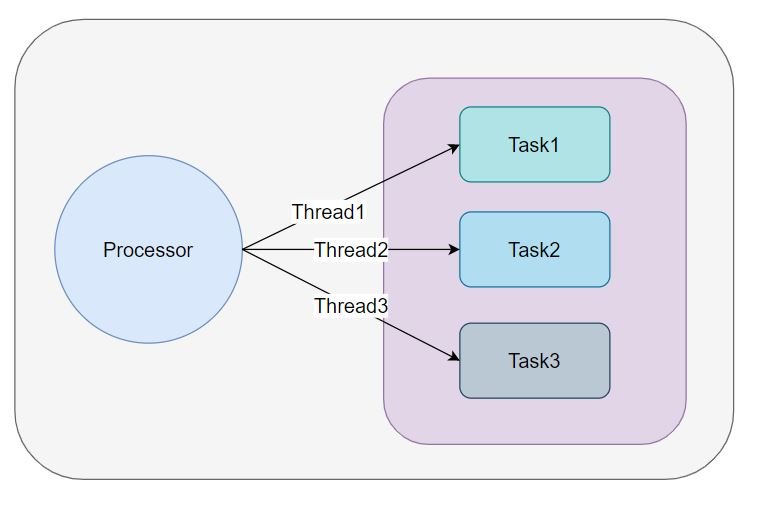Show List
Multithreading
Multithreading in Java refers to the ability of the Java Virtual Machine (JVM) to run multiple threads concurrently within a single program. A thread is a lightweight and independent unit of execution within a larger process. Multithreading allows for better utilization of CPU resources and improved performance by allowing multiple tasks to run simultaneously.

There are two ways in which a Thread can be created:
- Extending Thread Class
- Implementing the Runnable Interface
Extending Thread Class
class ThreadDemo extends Thread {
private Thread t;
private String threadName;
//Constructor
ThreadDemo( String name) {
threadName = name;
System.out.println("Creating Thread " + threadName );
}
//Override method from Thread class
public void run() {
System.out.println("Running Thread " + threadName );
try {
for(int i = 2; i > 0; i--) {
System.out.println("Thread: " + threadName + ", " + i);
// Make the thread sleep for a while.
Thread.sleep(100);
}
} catch (InterruptedException e) {
System.out.println("Thread " + threadName + " interrupted.");
}
System.out.println("Thread " + threadName + " exiting.");
}
//Override method from Thread class
public void start () {
System.out.println("Starting Thread " + threadName );
if (t == null) {
t = new Thread (this, threadName);
t.start (); //Run method is called when the thread is started.
}
}
}
public class Demo {
public static void main(String args[]) {
//Creating the thread object
ThreadDemo T1 = new ThreadDemo( "One");
//Starting first thread
T1.start();
//Creating another thread object
ThreadDemo T2 = new ThreadDemo( "Two");
//Starting second thread
T2.start();
}
}
In the example above, ThreadDemo class extends Thread class. So an object created from this class would be a thread. Methods run and start are overridden to provide the custom behavior to the thread (In this case to print the messages).
Output:
Creating Thread One Starting Thread One Creating Thread Two Starting Thread Two Running Thread One Running Thread Two Thread: One, 2 Thread: Two, 2 Thread: One, 1 Thread: Two, 1 Thread One exiting. Thread Two exiting. Process finished with exit code 0
Implementing the Runnable Interface
class RunnableDemo implements Runnable {
//Instance variables
private Thread t;
private String threadName;
//Constructor
RunnableDemo( String name) {
threadName = name;
System.out.println("Creating Thread " + threadName );
}
//Implement method from Runnable interface
public void run() {
System.out.println("Running Thread " + threadName );
try {
for(int i = 2; i > 0; i--) {
System.out.println("Thread: " + threadName + ", " + i);
// Make the thread sleep for a while.
Thread.sleep(100);
}
} catch (InterruptedException e) {
System.out.println("Thread " + threadName + " interrupted.");
}
System.out.println("Thread " + threadName + " exiting.");
}
public void start () {
System.out.println("Starting Thread " + threadName );
if (t == null) {
t = new Thread (this, threadName);
t.start ();//Run method is called when the thread is started.
}
}
}
public class Demo {
public static void main(String args[]) {
//Creating the thread object
RunnableDemo T1 = new RunnableDemo( "One");
//Starting first thread
T1.start();
//Creating another thread object
RunnableDemo T2 = new RunnableDemo( "Two");
//Starting second thread
T2.start();
}
}
In this example the thread class RunnableDemo is created by implementing the Runnable interface. Method run is implemented to provide the custom behavior to the thread (In this case to print the messages).
Output:
Creating Thread One Starting Thread One Creating Thread Two Starting Thread Two Running Thread One Thread: One, 2 Running Thread Two Thread: Two, 2 Thread: One, 1 Thread: Two, 1 Thread One exiting. Thread Two exiting. Process finished with exit code 0
Thread States
Java thread can be in any of the following state:
- New - When we create an instance of Thread class, a thread is in a new state
- Runnable/Running - When the thread is started
- Suspended - A thread can be suspended to pause the processing.
- Waiting - When thread is waiting for another thread to perform a task.
- Terminated - When execution is complete
Thread Priority
A priority can be assigned to threads based of the priority of task thread is to complete. setPriority() is the method to set priority and getPriority is the method to find the priority of a thread.
- Priority can be between 1 to 10
- 5 is default priority
Thread Methods
- start() – Starts the thread.
- getName() – It returns the name of the thread.
- sleep(long millis) – Stop the thread for the specified time.
- Join() – Stop the current thread until the called thread gets terminated.
- isAlive() – Check if the thread is alive.
- getState() – It returns the state of the thread.
- getPriority() – It returns the priority of the thread.
- interrupt() - Interrupts the thread
Leave a Comment